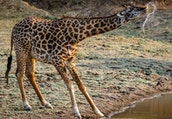- 1. Africa Meerkat Appearance: Meerkats are small, slender animals with a distinct appearance. They have a sandy or light brown coat with dark patches around their eyes, resembling "masks." Meerkats have a pointed snout and large, dark eyes that provide excellent vision.
- 2. Africa Meerkat Size: Adult meerkats typically weigh around 1.5 to 2.5 pounds (0.7 to 1.1 kilograms) and have a body length of about 10 to 14 inches (25 to 35 centimeters), excluding their tail.
- 3. Africa Meerkat Reproduction: Breeding in meerkats is typically restricted to the dominant pair within the group. The dominant female gives birth to a litter of usually 2 to 5 pups, and other members of the mob assist in caring for and protecting the young.
- 4. Africa Meerkat Habitat: Meerkats inhabit arid and semi-arid regions, including savannas, grasslands, and deserts. They prefer areas with loose, sandy soil, which is ideal for digging their extensive underground burrows.
- 5. Africa Meerkat Diet: Meerkats are omnivores and have a diverse diet. They primarily feed on insects, such as beetles, spiders, and scorpions. They also consume small vertebrates, fruits, and plant material.
- 6. Africa Meerkat Behavior: Meerkats are highly social animals and live in close-knit groups called mobs or gangs. These groups can consist of several individuals to up to 40 or more members. They work together to forage for food, raise young, and protect their territory.
- 7. Africa Meerkat Communication Meerkats are very vocal and use various calls to communicate with each other. They have different alarm calls to warn the group of potential dangers, such as predators like snakes, birds of prey, or other predators.
- 8. Africa Meerkat Conservation Status: Meerkats are listed as a species of "Least Concern" by the International Union for Conservation of Nature (IUCN) due to their widespread distribution and stable population.
Africa Meerkat
The meerkat (Suricata suricatta) is a small mammal and a member of the mongoose family. Although not exclusive to Africa, meerkats are commonly associated with the continent and are often found in the southern and southwestern parts of Africa.
Africa Safari Tour Book online The Meerkat safari
Here is some information about the meerkat:
Africa Meerkat Safari Tour
An Africa safari meerkat tour offers a delightful and unique opportunity to observe these charming and social creatures in their natural habitat. While meerkats are not the main focus of traditional African safaris, some regions in southern Africa, such as the Kalahari Desert, offer specialized tours and experiences focused on observing meerkats.
By planning ahead and choosing reputable safari operators or guides, Meerkats are captivating and social animals, and observing them in the wild provides a unique and memorable safari experience. Participating in responsible tourism practices helps protect the meerkats and their fragile desert ecosystem, ensuring that future generations can also enjoy the magic of encountering these charming creatures in the wild.
Here are some key points to consider for a meerkat-focused safari:
Africa Meerkats Safari Destinations
Safari Destinations: Meerkats are primarily found in the Kalahari Desert, which spans across several countries, including South Africa, Namibia, and Botswana. Specific areas within the Kalahari, such as the Tswalu Kalahari Reserve in South Africa or the Makgadikgadi Pans National Park in Botswana, are known for their meerkat populations.
Africa Meerkat Habituation
Meerkat Habituation: Meerkats in some areas have become accustomed to the presence of humans, which allows for a more intimate viewing experience. During meerkat habituation experiences, visitors can get up close to meerkat mobs without causing stress or disturbance to the animals.
Africa Meerkat Guided Walks:
Guided Walks: Participate in guided walks with experienced trackers and guides who understand meerkat behavior and movements. These guided walks can lead you to meerkat burrows, where you can watch these social animals interact, forage for food, and keep a lookout for potential dangers.
Africa Meerkat Sunrise and Sunset Tours:
Sunrise and Sunset Tours: Meerkats are most active during the early morning and late afternoon when they venture out of their burrows to warm themselves in the sun. Sunrise and sunset tours offer the best chances of observing meerkats engaging in their daily activities.
Africa Meerkat Accommodations
Choose accommodations located near the water bodies where Meerkats are commonly found. Many lodges and camps offer opportunities for boat safaris or have waterholes frequented by Meerkats.
Africa Meerkat Photography Opportunities
Photography Opportunities: Bring a camera with a zoom lens to capture close-up shots of meerkats and their interactions. A pair of binoculars will also be useful for better wildlife viewing.
Africa Meerkat Respect for Wildlife:
Respect for Wildlife: As with all wildlife encounters, it's crucial to observe meerkats from a safe distance and with the guidance of experienced guides to ensure both your safety and the well-being of the animals.
Africa Meerkat Additional Wildlife:
Additional Wildlife: While on your meerkat safari, you may also encounter other wildlife typical of the Kalahari Desert, such as gemsbok (oryx), springbok, bat-eared foxes, and various bird species.








 |
|  |
|  |
|  |
| 